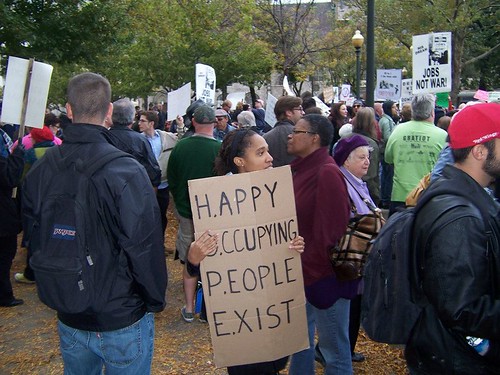
Thousands gathered for the Occupy Detroit demonstration and camp-in at Grand Circus Park on October 14, 2011. Detroit was the first major city where the crisis struck in the United States., a photo by Pan-African News Wire File Photos on Flickr.
Wall Street sit-in protest goes global
2:00am EDT
By Michel Rose
MILAN (Reuters) - Protesters worldwide geared up for a cry of rage on Saturday against bankers, financiers and politicians they accuse of ruining global economies and condemning millions to poverty and hardship through greed.
Galvanised by the past month's Occupy Wall Street movement, the global protest began on a sunny spring day in New Zealand and is due to ripple round the world to Alaska via London, Frankfurt, Washington and New York.
Riot police prepared for any trouble -- cities such as London and Athens have seen violent confrontations this year -- but it was impossible to say how many people would actually turn out despite a rallying call across social media websites.
"I've been waiting for this protest for a long time, since 2008," said Daniel Schreiber, 28, an editor in Berlin. "I was always wondering why people aren't outraged and why nothing has happened and finally, three years later, it's happening."
New Zealand and Australia got the ball rolling while most of traditionally reserved Asia was quiet. Several hundred people marched up the main street in Auckland, New Zealand's biggest city, joining a rally in the city square where about 3,000 chanted and banged drums, denouncing corporate greed.
About 200 gathered in the capital Wellington and 50 in a park in the earthquake-hit southern city of Christchurch.
In Sydney, about 2,000 people, including representatives of Aboriginal groups, communists and trade unionists, protested outside the central Reserve Bank of Australia.
"I think people want real democracy," said Nick Carson, a spokesman for OccupyMelbourne.Org, as about 1,000 gathered in the Australian city. "They don't want corporate influence over their politicians. They want their politicians to be accountable."
Hundreds marched in Tokyo, including anti-nuclear protesters. Dozens in Manila, capital of the Philippines, marched on the U.S. Embassy waving banners reading: "Down with U.S. imperialism" and "Philippines not for sale."
The protests are billed as peaceful. But in a sign of what may happen, a group of students stormed Goldman Sachs's offices in the Italian city of Milan on Friday.
The students broke into the hall of the Goldman Sachs building in the heart of Milan's financial district. The protests were quickly dispersed but red graffiti was daubed on its walls expressing anger at Prime Minister Silvio Berlusconi and saying "Give us money."
Demonstrators also hurled eggs at the headquarters of UniCredit, Italy's biggest bank.
Italian police were on alert for thousands to march in Rome against austerity measures planned by Berlusconi's government.
SOMETHING HAPPENING HERE
In Britain, demonstrators aim to converge on the City of London -- a leading international financial center -- under the banner "Occupy the Stock Exchange."
"We have people from all walks of life joining us every day," said Spyro, one of those behind a Facebook page in London which has grown to some 12,000 followers in a few weeks.
Spyro, a 28-year-old who has a well-paid job and did not want to give his full name, summed up the main target of the global protests as "the financial system."
Angry at taxpayer bailouts of banks since 2008 and at big bonuses still paid to some who work in them while unemployment blights the lives of many young Britons, he said: "People all over the world, we are saying, 'Enough is enough'."
Greek protesters aligned with Spain's "Indignant" movement called an anti-austerity rally for Saturday in Athens' Syntagma square, scene of many rallies during the financial meltdown.
"What is happening in Greece now is the nightmare awaiting other countries in the future. Solidarity is people's weapon," the Real Democracy group said in a statement calling on people to join the protest.
TIME TO UNITE
Concrete demands are few other than a general sense that the "greedy and corrupt" rich, and especially banks, should pay more and that elected governments are not listening.
"It's time for us to unite; it's time for them to listen; people of the world, rise up!" proclaimed the website United for #GlobalChange. "We are not goods in the hands of politicians and bankers who do not represent us ... We will peacefully demonstrate, talk and organize until we make it happen."
In Germany, where sympathy for southern Europe's debt troubles is patchy, the financial center of Frankfurt and the European Central Bank in particular are expected to be a focus of marches called by the Real Democracy Now movement.
In the United States, the hundreds of protesters at Manhattan's Zuccotti Park called for more people to join them. Their example has also prompted calls for similar occupations in dozens of U.S. cities from Saturday.
In Houston, protesters plan to tap into anger at big oil companies.
Still, some analysts thought the protest momentum in some countries such as Greece and Spain was wearing out.
"More people agree with these protests than actually take part," said Professor Mary Bossis of the University of Piraeus.
Despite despair over austerity measures that have slashed wages and pensions and put hundreds of thousands out of work, the spark for sustained action was lacking, she said.
"There is anger, there is rage ... but what it takes to overturn the current situation is missing," she said.
The targets of the protesters' wrath are also unlikely to be around to feel it. The City of London, for example, is deserted at weekends as wealthy city workers head for the golf club, country house or generally enjoy a spot of rest and recreation.
(Reporting by Reuters bureaux; Writing by Angus MacSwan, Alastair Macdonald and Nick Macfie; Editing by Janet Lawrence)
No comments:
Post a Comment